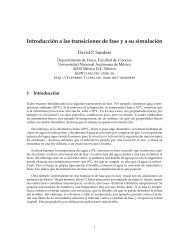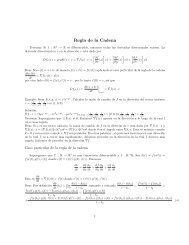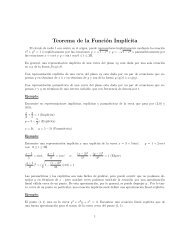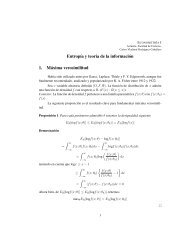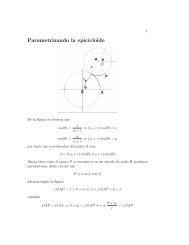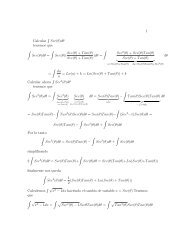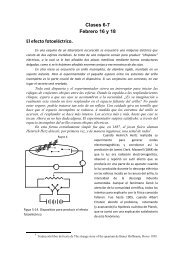"Surely You're Joking, Mr. Feynman!" - unam.
"Surely You're Joking, Mr. Feynman!" - unam.
"Surely You're Joking, Mr. Feynman!" - unam.
Create successful ePaper yourself
Turn your PDF publications into a flip-book with our unique Google optimized e-Paper software.
on.<br />
I tried to point to the sign that showed the price of milk, but he still didn't catch<br />
Finally, some stranger nearby ordered milk, and I pointed to it.<br />
"Oh! Milk!" he said, as I nodded my head yes.<br />
He handed me the bottle, and I said, "Thank you very much!"<br />
"You SON of a GUN!" he said, smiling.<br />
I often liked to play tricks on people when I was at MIT. One time, in mechanical<br />
drawing class, some joker picked up a French curve (a piece of plastic for drawing<br />
smooth curves a curly, funnylooking thing) and said, "I wonder if the curves on this<br />
thing have some special formula?"<br />
I thought for a moment and said, "Sure they do. The curves are very special<br />
curves. Lemme show ya," and I picked up my French curve and began to turn it slowly.<br />
"The French curve is made so that at the lowest point on each curve, no matter how you<br />
turn it, the tangent is horizontal."<br />
All the guys in the class were holding their French curve up at different angles,<br />
holding their pencil up to it at the lowest point and laying it along, and discovering that,<br />
sure enough, the tangent is horizontal. They were all excited by this "discovery" even<br />
though they had already gone through a certain amount of calculus and had already<br />
"learned" that the derivative (tangent) of the minimum (lowest point) of any curve is zero<br />
(horizontal). They didn't put two and two together. They didn't even know what they<br />
"knew."<br />
I don't know what's the matter with people: they don't learn by understanding;<br />
they learn by some other way by rote, or something. Their knowledge is so fragile!<br />
I did the same kind of trick four years later at Princeton when I was talking with<br />
an experienced character, an assistant of Einstein, who was surely working with gravity<br />
all the time. I gave him a problem: You blast off in a rocket which has a clock on board,<br />
and there's a clock on the ground. The idea is that you have to be back when the clock on<br />
the ground says one hour has passed. Now you want it so that when you come back, your<br />
clock is as far ahead as possible. According to Einstein, if you go very high, your clock<br />
will go faster, because the higher something is in a gravitational field, the faster its clock<br />
goes. But if you try to go too high, since you've only got an hour, you have to go so fast<br />
to get there that the speed slows your clock down. So you can't go too high. The question<br />
is, exactly what program of speed and height should you make so that you get the<br />
maximum time on your clock?<br />
This assistant of Einstein worked on it for quite a bit before he realized that the<br />
answer is the real motion of matter. If you shoot something up in a normal way, so that<br />
the time it takes the shell to go up and come down is an hour, that's the correct motion.<br />
It's the fundamental principle of Einstein's gravity that is, what's called the "proper<br />
time" is at a maximum for the actual curve. But when I put it to him, about a rocket with<br />
a clock, he didn't recognize it. It was just like the guys in mechanical drawing class, but<br />
this time it wasn't dumb freshmen. So this kind of fragility is, in fact, fairly common,<br />
even with more learned people.<br />
When I was a junior or senior I used to eat at a certain restaurant in Boston. I went<br />
there by myself, often on successive evenings. People got to know me, and I had the



